A smart plug is a staple for our smart home project as it allows us to control any traditional plugged in device so we have infinite use cases and Sonoff has launched a new model called the S60ZBTPF.
Why does Sonoff S60ZBTPF have this price?
Sonoff offers a 16A ON/OFF socket, with Zigbee technology, consumption measurement and other interesting functions, which is an excellent compromise in terms of quality/price.

Advantages and Disadvantages of the S60ZB Zigbee socket
Advantages
- Zigbeetechnology: If you want to have a unified smart home, Zigbee technology is an excellent choice with different smart devices from different brands in the market.
- Compatibilities: This S60ZBTPF plug is compatible with Sonoff hubs with Ewelink, Home Assistant and Jeedom with ZHA and Zigbee2MQTT.
- Price: Sonoff often has smart devices at reduced prices and this is also the case for this S60ZBTPF socket.
- 16A: This plug can handle electrical devices up to 16A (3680W).
- Consumption measurement: In addition to being able to control an electrical device, you can also measure its consumption in real time.
- State memorisation: This socket memorises its state before a power cut to return to this state when the power comes back on (you can also choose another defined state).
- Timer: You can define a time for the socket to switch itself off or on automatically.
- Overload protection: This socket has an overload protection function.
Disadvantages
- Zigbee hub required: In order to control your Sonoff plug, you need to use a compatible Zigbee hub.
- LED indicator cannot be deactivated: You cannot deactivate the LED indicator, so you should take this factor into account so that it does not disturb you at night.
- We don’t have a light ring: It would have been interesting to have a light ring that changes colour according to the consumption, to have a trend of this consumption.
Sonoff S60ZBTPF Plug Tutorial
Today we are going to discover this plug called S60ZBTPF.

General characteristics of Sonoff S60ZBTPF
If we open the packaging, we find an instruction manual.

And the Sonoff plug.
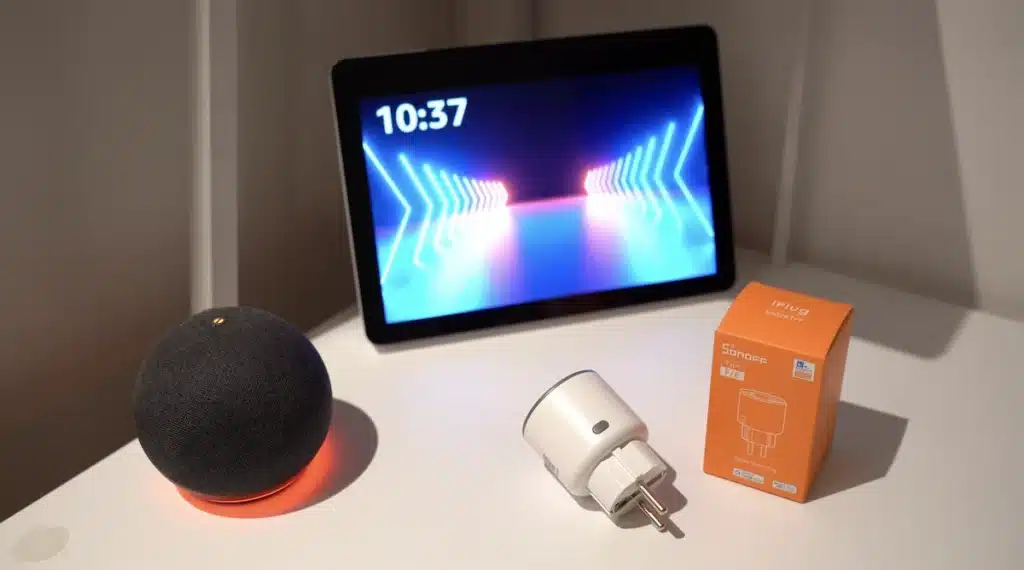
This plug is white with a grey ring and grey physical button.

And it has dimensions of 50*50*61.5 mm being quite compact which is an interesting first detail since if we put it on a power strip, we can still connect other devices next to this Sonoff plug.

This was not possible with the previous Sonoff model, being a plug that took up a lot of space and therefore, if we already had devices plugged in, it was not possible to plug in this Sonoff device.
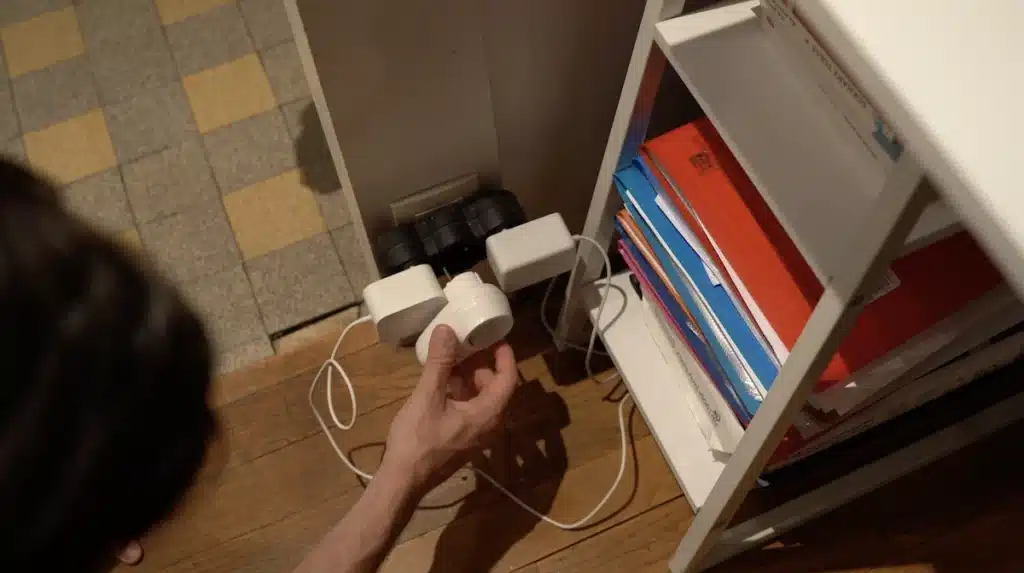
And speaking of this old Sonoff Zigbee plug, it didn’t measure power consumption either and this new S60ZBTPF model does.

In other words, in addition to being able to control a device connected to this socket by ON/OFF from our phone.

We will also be able to follow its energy consumption in real time, which is another very interesting detail, being able to monitor the consumption of any plugged-in device and thus be able to take measures if necessary.

Speaking of which, the standby consumption of this Sonoff plug is less than 1W according to the manufacturer.

On the side of the plug, we have a physical button that allows us to turn ON or OFF our plugged device being another practical detail given that if we want to turn ON or OFF this plugged device and we are at home, we do not need to do it from our phone and we do not need to plug or unplug this device, we simply give the physical button of Sonoff.

And next to this physical button we have LED indicators, one in blue which is handy to know when the socket is active and when it is in association mode and another one in red when the socket is ON and this red LED turns off when the socket is OFF.

With this plug, we can control an electrical device up to 16A, i.e. up to 3680W at 230V, although it is always recommended not to reach the limit value in order to have a longer durability of this Sonoff plug.

And if an electrical device connected to this socket exceeds this limit value, we have an overload protection function, i.e. the Sonoff S60ZB will cut off the power supply when it detects excessive current, preventing damage and ensuring safe operation.

This Sonoff plug communicates with Zigbee technology, meaning that we will need to link it with a compatible Zigbee hub such as one from Sonoff or universal hubs such as Jeedom and Home Assistant with ZHA or Zigbee2Mqtt.

The whole point of this smart plug is to be able to control a plugged-in electrical device, from our phone, anywhere in the world and at the same time track its energy consumption.
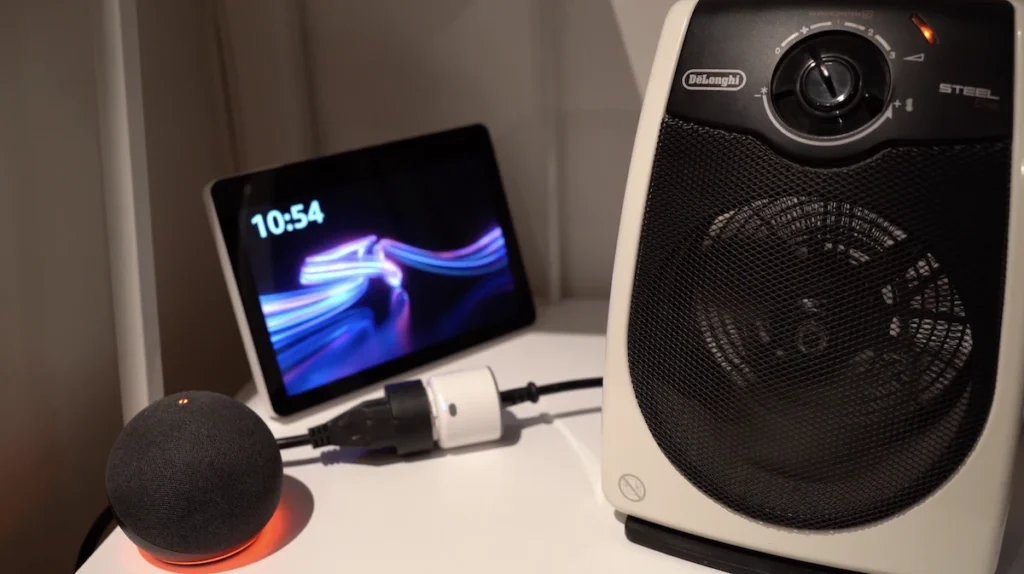
And of course, you can also have voice control of this smart plug by connecting your home automation hub to an Amazon Alexa or Google Home voice assistant.

Also, being a Zigbee plug, one of the great advantages of this technology is that this type of device connected to the mains is a Zigbee router, which means that it automatically repeats the signal.

This means that if you have Zigbee devices far away from your home automation hub with communication problems due to the long distance, you can use this type of socket in your home to automatically improve the communication range.

Another interesting function of this Sonoff socket is the status memory which, as its name suggests, is a function that allows the socket to recover its status when the power returns after a power failure, as we will see below.

And finally, “Inching mode” is a function that allows you to program an automatic activation or deactivation time for the socket.

How to install the Sonoff S60ZBTPF Zigbee socket
A smart plug is one of the easiest devices to use. You simply plug it in above a traditional socket in your home and you can NOT use it outdoors as it is a plug designed for indoor use with operating temperature between -10°C to +40°C and operating humidity level of 5 % to 95 % relative humidity (non-condensing).

Whatever you plug into this socket can be controlled remotely, from your phone, and you can also track its energy consumption in real time.

As a Zigbee communicating plug, you should have it close to your Zigbee home automation hub by 10 to 15 metres or you can have it further away if you have more Zigbee devices in your home that act as signal repeaters such as other sockets, light bulbs, modules and more.
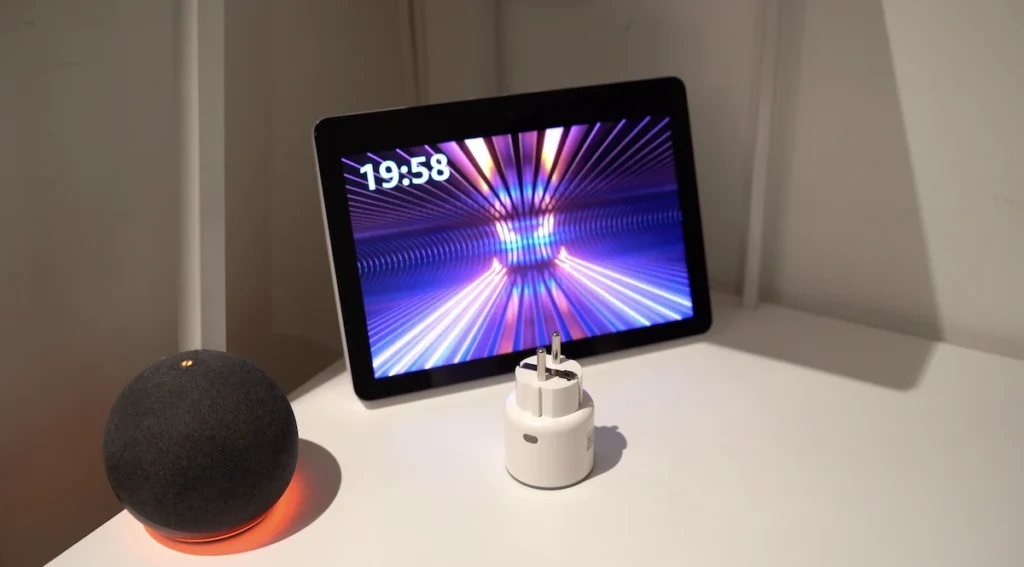
How to pair the Sonoff S60ZBTPF socket
To pair the Sonoff S60ZB socket, you need to put your home hub in pairing mode. In my example, I use one of the world’s most popular solutions which is the Zigbee2Mqtt platform with the Home Assistant Green home automation hub and the process is similar with other home automation hubs.
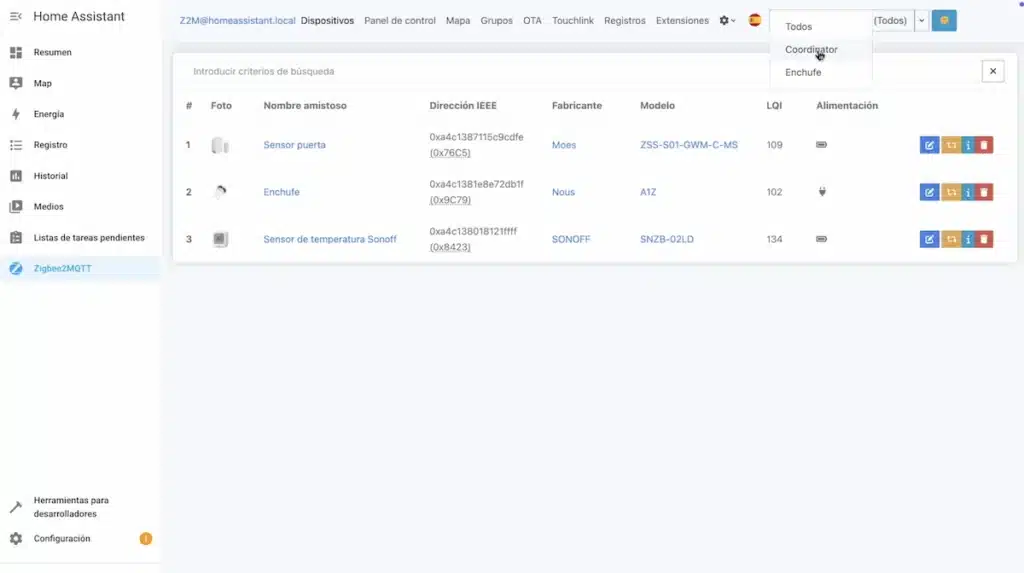
At this point, simply plug in your Sonoff plug.

And you should see a flashing LED, meaning that it is in association mode and should automatically join the Zigbee network of your home automation hub.

If this is not the case because, for example, you have left the plug plug in for more than 180 seconds without connecting it, you can press the physical button for at least 5 seconds to switch it back to association mode.

Ready, after a few seconds, you should see your plug available on the interface of your home automation hub, so now, you will be able to turn it ON and OFF from anywhere in the world and measure the energy consumption of the plugged device.

Detailed functions of S60ZBTPF
To begin with, “State” is the plug’s most prominent function, allowing you to turn your plugged-in device ON or OFF, from anywhere in the world.

“Power-on behavior” is a function that memorises a configured socket status.

There are cases where, for example, if there is a temporary power cut and the power comes back on, our smart device, which was initially OFF, turns ON when the power comes back on without having the possibility of modifying this setting. For example, if you have a lamp connected to a smart plug that was OFF before the power cut and the power comes back on, it could be switched ON and therefore you have a light on for days or even weeks if you were on holiday at the time.

But Sonoff has this state memorisation option so if we take the same example with our lamp, thanks to the Sonoff plug, we always keep the same state as before the power cut, so if our lamp was off before the power cut, it will also be off when the power comes back on.

On the other hand, it may also be in our interest to switch our socket back to ON after a power failure if it was before, for example, if we have it to control a refrigerator.

These are examples of use with the “Previous” option configured, but you can also choose to have the plug always ON or always OFF, or even always in a reversed state, when the power comes back on.

“Current” is the current value of the plugged-in electrical device.

“Voltage” is the voltage we have at the S60ZBTPF socket.
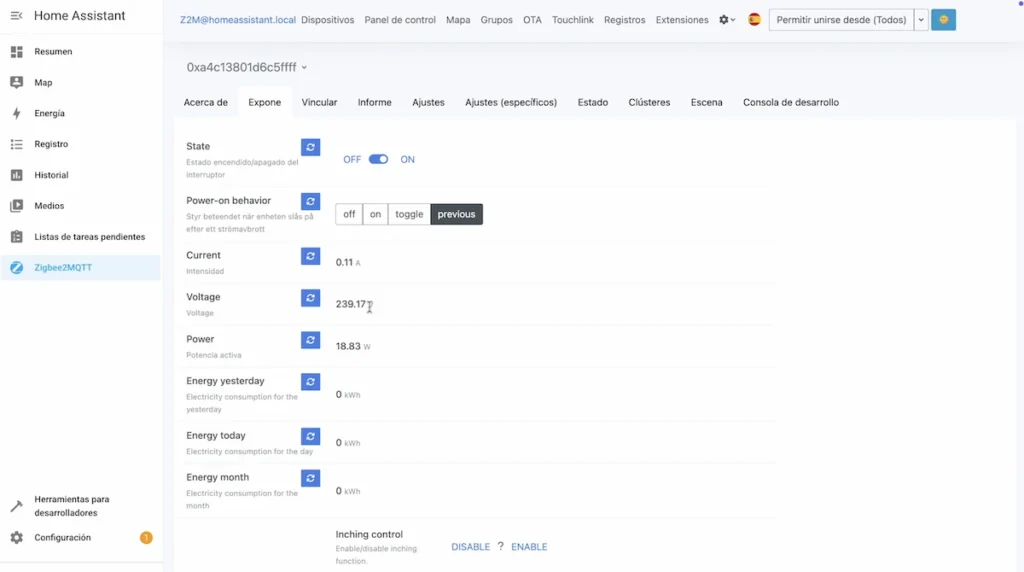
And “Power” the active power of the plugged-in device.

For example, I have a fan heater that I have plugged into this Sonoff S60ZBTPF socket.
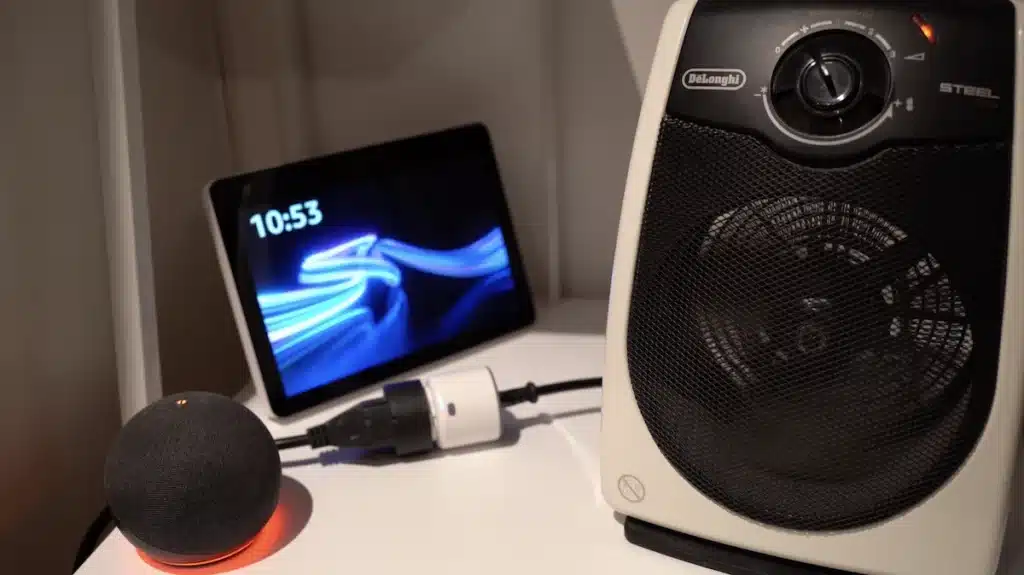
If I have it in fan mode, it consumes 18.83 W.

If I put it in heating mode on level 1, it consumes approximately 865W.
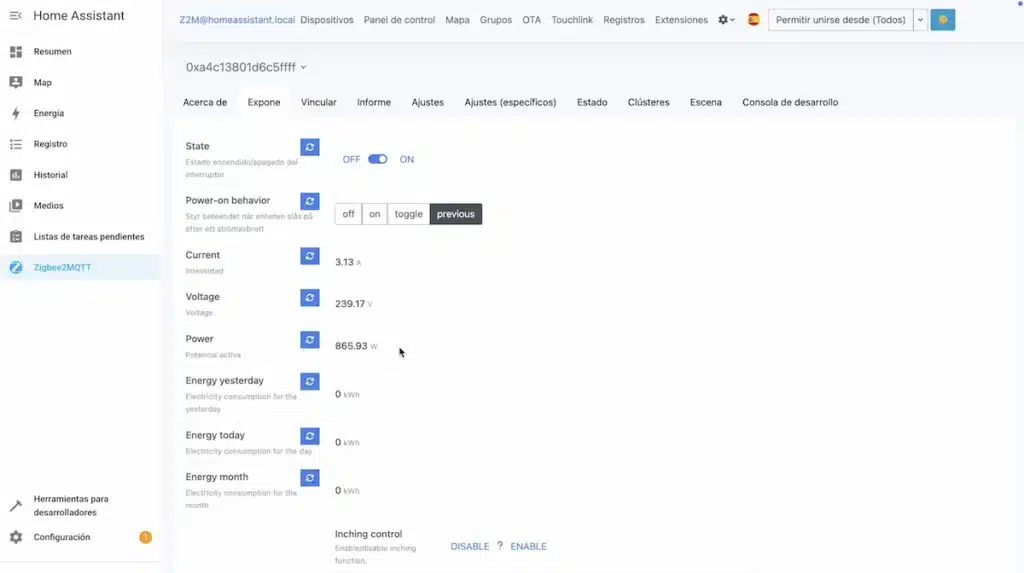
On level 2 it consumes approximately 1400W.

At level 3 it consumes approximately 2130W.
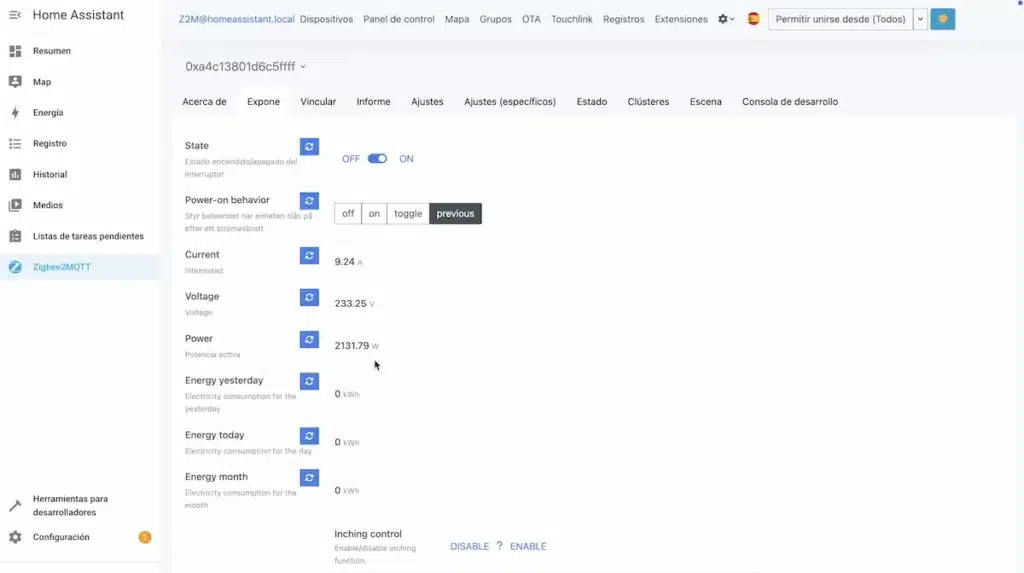
Then we have “Energy yesterday” which lets you know how much we consumed yesterday in total, “Energy today” lets you know today’s energy consumption and “Energy month” lets you know the month’s consumption.

For example, if we have an electrical device that consumes 1000W per hour and we had it on for 5 hours, then it should have consumed 5 kWh. And if you look at the price of energy consumption in your country, you will know how much you have spent with this device plugged in.

Then there is the “Inching control set” function which allows you to set a time for the socket to switch off or on automatically.

This can be interesting for some use cases where we want to have a defined activation time, such as a user who has a smart plug that is activated at night when the price of electricity is cheaper during off-peak hours to recharge an electric scooter and therefore, with this timer function, could decide an automatic deactivation time for this plug so as not to have it on all night long.

“Outled control protect” allows you to activate or deactivate the overload protection and “Overload protection” is the function that allows you to define minimum and maximum values for voltage, current and power so that the socket is put into protection.
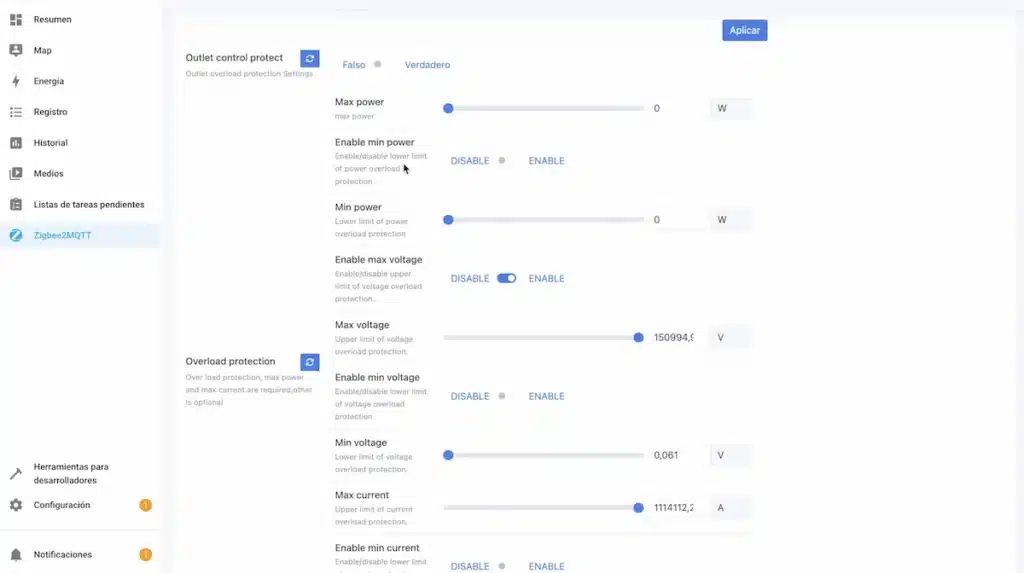
And “Link quality” is the link quality of the socket in our Zigbee network, i.e. whether or not it can communicate correctly with our Zigbee home automation hub.

And under “Settings (specific)” we can calibrate voltage, current and power values if we notice an inaccuracy of the socket measurements.

This Zigbee S60ZBTPF plug can be used in different contexts. I have mentioned a user who recharges his electric scooter at scheduled times. Also another user has smart plugs in his technical room to activate his pool pump, the lights in this pool and the robot in this pool.

Or this plug can also be very useful to monitor the activity of an electrical device, for example, to know when it has a problem in terms of energy consumption.

Of course, your imagination is your limit and you will be able to have multiple uses and automations with this Zigbee S60ZBTPF plug.

It would have been interesting to have an additional function to deactivate the LED indicator if we have this socket in a room and do not want to be disturbed at night.

And also a ring that changes colour according to the energy consumption so that we can have a trend of our consumption, low, medium or high without having to see it on our phone.

But even so, it is, in my opinion, one of the most interesting smart plugs on the market as it has all the essential functions to be the one chosen for your project, allowing you to give intelligence to a wide variety of traditional devices, monitor electrical consumption and improve the communications of your Zigbee network.

Generally purchased together


Buy now your Sonoff S60ZBTPF Zigbee Plug

Graduated with a Higher Technician’s Certificate in Home Automation, a Professional Bachelor’s degree in E-commerce and Digital Marketing, and a Master’s degree in SEO, I have been working since 2013 in a home automation e-commerce company called Domadoo, where I have the opportunity to test a large number of the popular Smart Home products on the market.